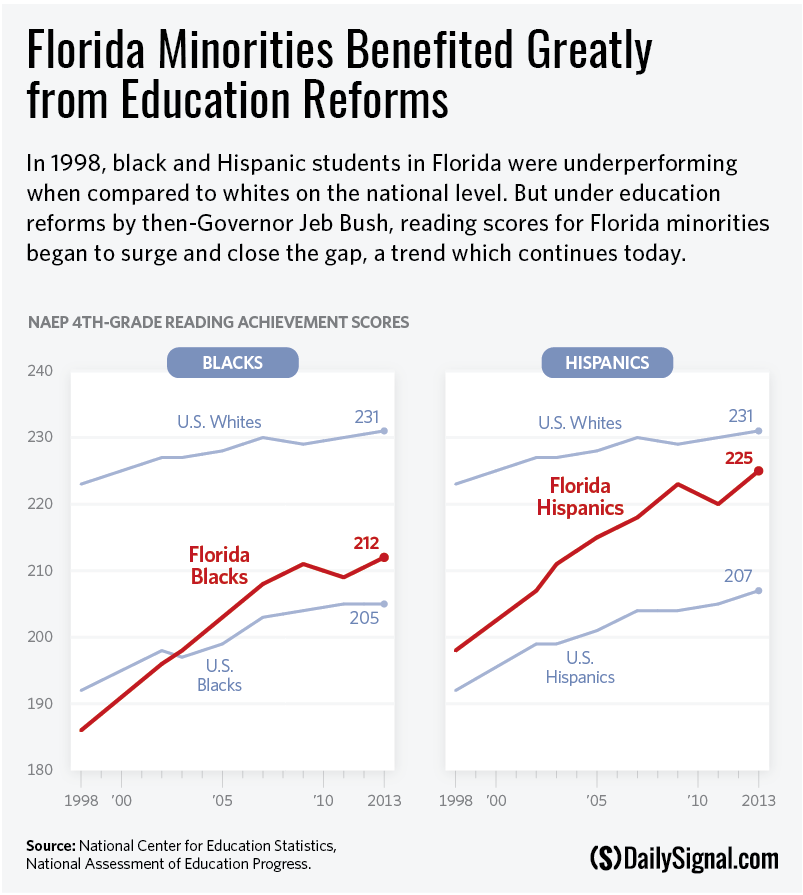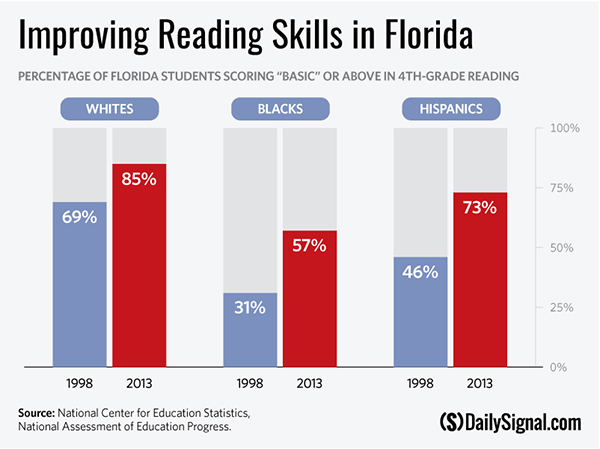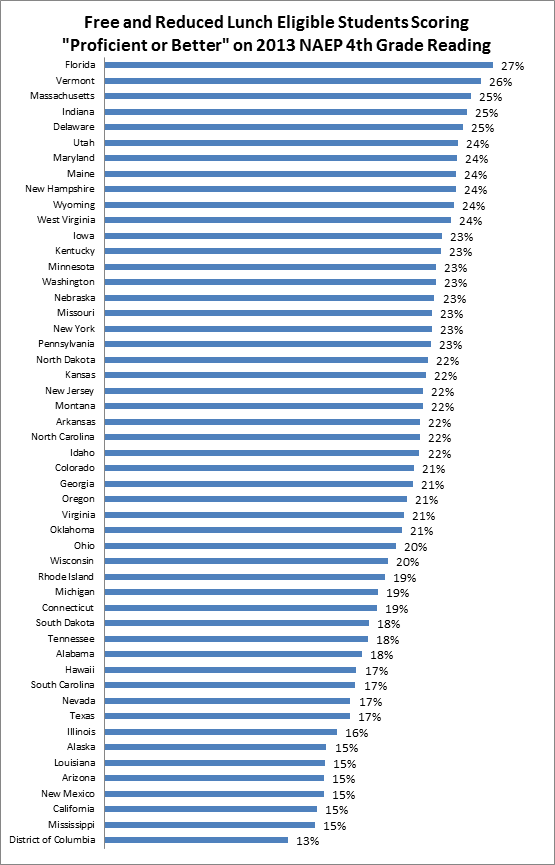True or False? Jeb Bush’s Education Reforms Boosted Florida’s Schoolchildren
Ken McIntyre /
It’s not every governor who can say the record shows his state’s schoolchildren did better because he applied conservative principles of choice and accountability.
Jeb Bush can and does.
“The aggregate improvements we’ve seen in Florida really can’t be ignored,” Marcus Winters, an assistant professor at the University of Colorado’s College of Education who has studied what Bush did there, told The Daily Signal. “The improvements were very serious and very substantial, and have been maintained over a long period of time.”
Winters, whose work at the Colorado Springs campus focuses on K-12 education policies such as those Bush instituted in Florida, says the former governor deserves more credit for the state’s “extraordinary” progress in academic achievement and school choice.
His critics tend to favor the priorities of teachers unions, Winters added, and they “throw dust in the air” to distract from the facts because “they have different ideas politically about the type of reform we should be doing in schools.”
A major contender for the Republican nomination for president, Bush has begun to highlight his education record in visits to Iowa, New Hampshire and South Carolina, all states holding early contests in next year’s primary season.
“We’re just basically casting aside large numbers of people.”-@JebBush on the need for education reform.
His approach is about “constantly challenging an education system that only yields about a third of our kids [as] college- or career-ready,” Bush told a crowd of about 1,000 gathered March 7 for an agriculture summit in Des Moines, Iowa.
“No community can be sustainable if you have those kinds of results,” Bush said, because potential employers want to see “an educated workforce” before they invest in an area and create good jobs “immersed in technology and innovation.”
“We’re just basically casting aside large numbers of people,” he added of the nation’s entrenched public school system.
The Florida Reforms
While Bush was governor of Florida from 1999 to 2007, the state “made dramatic improvements in the academic outcomes of all its students,” a report from The Heritage Foundation concluded in 2010.
It said Florida also made “significant progress” in narrowing the nationwide achievement gap in grades K-12 between white students and minorities, particularly blacks and Hispanics.
The Heritage report by Matthew Ladner and Lindsey M. Burke credited parental choice, higher standards, and both accountability and flexibility for pushing the state’s black students to match or outscore the statewide reading average for all students in eight states, and for propelling Hispanics to do the same compared with 31 states.
Beginning in 1999, Bush and the state legislature implemented reforms emphasizing choice in public and private schools (including charter schools and virtual education); annual tests and grading schools and districts A through F based on test results; requiring illiterate children to repeat third grade; performance-based bonuses for teachers; and making it easier for talented applicants to gain teacher certification.
In one of the most hotly debated aspects of the changes, any student at a public school that got an F twice in four years could get a voucher to move to a different public or private school.
The initiatives came against a national backdrop of ever-increasing per-student spending and reduced class sizes—federally supported policies preferred by teachers unions—that left academic achievement relatively flat and graduation rates stagnant, Ladner and Burke argued:
Florida enacted a series of far-reaching K-12 reforms despite opposition by the teacher unions. The result was unique: The unions effectively lost control of K-12 policy in Florida.
And the state’s students went on to make the strongest gains in the nation on a test known as NAEP, the National Assessment of Educational Progress, since 2003, the first year that all 50 states used the exam.
Some conservatives regard Bush with deep suspicion because he has not renounced his early support for Common Core education standards even as they have faltered in implementation and been shaped by grants from the Obama administration.
Others see Bush’s refusal to abandon Common Core as a virtue, evidence that he would rather fix what’s broken than give up on an idea he believes in because it’s easier politically.
Put aside the ruckus in recent years over the federal government’s role in “incentivizing” the adoption of common academic standards, however, and Bush’s record in achieving what the Heritage report called “meaningful academic improvement” is the sort of story that heartens parents who harbor fears about their children’s future.
“It’s really difficult to argue that Florida is not much better educationally because of the reforms of the Jeb Bush administration,” said Winters, whose studies took him to the state for much of Bush’s second term and who also writes about education as a senior fellow at the Manhattan Institute. He added:
If minority children nationwide had made the same improvement as their counterparts in Florida, we would have closed the achievement gap nationally. It’s pretty impressive, I think. … Everything New York City was doing [in public school reform] they were doing because they were trying to emulate Florida.
Achievement Built to Last?
Eight years since Bush left the governorship, the Florida reform model called the A+ Plan for Education continues to be considered and adopted by other states—thanks in part to the marketing efforts of the Foundation for Excellence in Education, an outfit that Bush put together.
More to the point, education experts say, Florida schoolchildren keep gaining ground based on his reforms and others for which he set the stage.
“Public schools are still chronically underfunded and teachers are left feeling underappreciated,” says Mark Pudlow of @FloridaEA
But that’s not how the state’s largest teachers union, the Florida Education Association, sees it.
“After 15 years of this approach, students are a little better at taking tests,” FEA spokesman Mark Pudlow told The Daily Signal, “but many of the subjects that get children excited about learning have been curtailed or eliminated so that they can spend more time on the tests, public schools are still chronically underfunded and teachers are left feeling underappreciated.”
Asked by The Daily Signal to update data in her report, however, Burke said the latest U.S. Department of Education statistics show the 2011 reading score for Florida fourth-graders was above the national average.
In addition, their 16-point gain from 1992 to 2011 was bigger than all other gains reported in large states as well as bigger than the national average.
“Florida has been a leader in education reform for well over a decade,” @lindseymburke says.
Black students in both Florida and California made greater gains than their peers nationally, Burke said. She also noted this finding: “Between 2003 and 2011, Florida students with disabilities and those eligible for free or reduced-price school lunch made greater gains than their peers in the nation.”
As for Hispanic students, the Ladner-Burke report predicted they could exceed the national average for white students. Checking the latest raw numbers at the request of The Daily Signal, Burke said they show Hispanics in Florida tied the national average in 2011 and outstripped it by four points in 2013.
That means the average Hispanic fourth-grader in Florida reads better than the average American fourth-grader.
Burke, Heritage’s Will Skillman fellow in education, said the latest NAEP test scores also show “tremendous gains for low-income students.” Florida leads the nation in percentage of low-income fourth-graders (27 percent) who scored proficient or better on the reading test in 2013. She told The Daily Signal:
Florida has been a leader in education reform for well over a decade. The Sunshine State has successfully married transparency of outcomes with choice – the key ingredient to empowering families to understand how their children are doing in school and to act on that information. Without the ability to exit underperforming schools, transparency of outcomes has no teeth.
How the Teachers Unions See It
Those who disagree with the Bush approach—often because they are allied with and financed by the teachers unions he took on—warn that the A+ Plan solutions are “corporate-backed” and aren’t in the best interests of all children.
Pudlow, the FEA spokesman, said in an email:
Jeb Bush radically altered education in Florida. He took standardized tests that were designed to be a diagnostic tool for teachers and parents and tied them to school grades, retention, graduation rates and [this] led to tests being used to evaluate teachers. He pushed voucher schemes with little accountability and opened the door to for-profit charter chains.
The FEA went to court to try to stop a Bush-era program that grants individuals and corporations dollar-for-dollar tax credits for contributing to a scholarship program that allows children from low-income families to attend a private school of their parents’ choice.
By diverting money from public schools to religious institutions, the teachers union contends, the program violates the state constitution.
Burke identifies that program, along with the McKay Scholarship Program, which provides vouchers to attend private schools for children with special needs, as two of the most significant reforms launched while Bush was governor.
Burke said 60,000 low-income children have scholarships to attend private schools; 26,000 other kids are McKay scholars, up from 20,530 in the 2008-09 school year.
About 250,000 children are enrolled in charter schools, up from 100,000 in 2009, and the 130,000 that signed up for virtual education nearly doubled from 71,000.
“The A+ Plan @JebBush established in Florida is a model for how states can reform education,” @kristymcampbell says.
In Greenville, S.C., recently, Bush visited Hidden Treasure Christian School, which serves 34 children with mental and developmental disabilities and accepts the sort of vouchers or scholarships that he pioneered in Florida.
In the four years since the Ladner-Burke paper examining Florida’s gains and influence, Mississippi and North Carolina have joined Georgia, Ohio, Oklahoma and Utah in creating similar special-needs voucher programs.
Trying to Stop the Spread
“The A+ Plan Governor Bush established in Florida is a model for how states can reform education,” Bush spokeswoman Kristy Campbell told The Daily Signal. “He believes states are the true laboratories for reform. Through choice and accountability, Florida has become a national leader in raising student achievement and is one of the only states to make progress in closing the achievement gap.”
Critics such as academics William Mathis and Sherman Dorn argue that Bush’s foundation peddles a full menu of necessary reforms to other states because of insufficient proof that any one piece was responsible for Florida’s improved scores on fourth-grade reading tests.
“ ‘Doing whatever they did’ is the policy equivalent of superstitions baseball players follow,” @shermandorn says.
“Governor Bush and other conservative education reformers ignore the best part of his reform efforts and have pushed all the other parts,” Dorn wrote March 9, identifying that “best part” as Florida’s creating a Reading Research Center and hiring reading coaches to help struggling students.
Dorn, who taught “social-science and humanities perspectives on education” at the University of South Florida from 1996 until last year, objects to the further spread of reforms opposed by Florida’s teachers union.
He writes:
‘Doing whatever they did’ is the policy equivalent of superstitions baseball players follow. … ‘Do everything I tell you Florida did’ is like wearing beards until the end of a season.
Bush’s detractors suggest that one reform, holding back third-graders who don’t get a minimum reading score, not only created an artificial achievement spike for those who go on to fourth grade but also serious adjustment issues for those who didn’t get the “social promotion.”
Mathis, managing director of the National Education Policy Center at the University of Colorado-Boulder, for years has accused Bush of “overselling” his Florida policy reforms.
“Fundamentally,” Mathis wrote in 2011, “Mr. Bush’s presentation is based on the fallacious causal claim that his selected set of loosely coupled reforms introduced in Florida between 1992 and 2011 caused fourth-grade reading score gains. No evidence is provided to sustain this linkage.”
Mathis declined to be interviewed by The Daily Signal, referring a reporter to Dorn.
Dorn, now director of educational leadership and innovation at Arizona State University’s Mary Lou Fulton Teachers College, preferred to note only that Bush’s reforms were all “center-right.” He did, however, agree to characterize one change in the former governor’s approach.
“Since leaving office, Governor Bush has spoken much more about technology,” Dorn told The Daily Signal, especially championing “virtual schools” as part of K-12 education choices.
‘Willfully Misreading the Evidence’
The National Education Policy Center, which depends on financial support from the National Education Association (the country’s biggest teachers union) and its state affiliates, gave the Ladner-Burke report a facetious “Bunkum Award.”
Mathis and others affiliated with the center sought to marginalize the paper for crediting Bush with advancing student achievement and school choice. Their report for Heritage, Columbia University’s Madhabi Chatterji argued in her review, “cherry picks the best data.”
The same policy center later presented Ladner with a “lifetime” Bunkum Award and sought to dismiss his credibility and studies because he had become a senior adviser to Bush’s Foundation for Excellence in Education.
Ladner responded that critics such as Chatterji and Mathis, a former superintendent of schools in Vermont, ignored his examinations of other possible reasons for student gains in Florida.
“You have to willfully misread the evidence to suggest the Florida story isn’t positive,” researcher @MarcusAWinters says.
Winters, who has no formal association with Bush, told The Daily Signal that Ladner’s joining of interests with the former governor at his foundation makes the progress in Florida no less real or influential.
“To argue at this point that the reforms of Florida were not producing substantial gains for kids I think is to ignore the high quality evidence that is out there,” Winters said, adding: “You have to willfully misread the evidence to suggest that the Florida story isn’t a positive one.”






